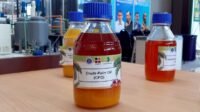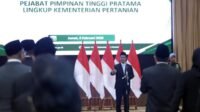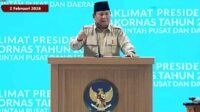PALMOILMAGAZINE, JAKARTA – According to data from the Ministry of Trade, the European Union (EU) ranks as Indonesia’s fifth-largest export destination and third-largest import source. Between January and November 2024, Indonesia’s exports to the EU reached USD 16 billion, while imports from the EU totaled USD 11.6 billion, bringing their total trade to USD 27.6 billion. In 2023, their total trade value was recorded at USD 30.8 billion.
Indonesia’s primary exports to the EU include palm oil and its derivatives, copper ore, industrial fats, footwear, as well as meal and other solid residues. Meanwhile, Indonesia imports motor vehicles, pharmaceuticals, transport equipment, and industrial machinery from the EU.
In terms of investment, the EU was Indonesia’s eighth-largest source of foreign direct investment (FDI) in 2023, with a total value of USD 2.33 billion, marking an 11% increase from the previous year.
Also Read:
To strengthen trade relations, Deputy Minister of Trade Dyah Roro Esti Widya Putri held a meeting with over 20 business representatives from the European Union-ASEAN Business Council (EU-ABC), led by Secretary Gustaaf Reerink, in Jakarta on Thursday, February 6.
During the meeting, the Indonesian government reaffirmed its commitment to fostering a business-friendly environment to accelerate national economic growth, including through closer collaboration with the EU.
“The EU plays a crucial role for Indonesia, particularly in boosting trade and investment across various sectors, from renewable energy to digital transformation. We believe that Indonesia and the EU can continue to strengthen mutually beneficial cooperation,” Deputy Minister Roro stated in an official release quoted by Palmoilmagazine.com on Friday, February 14, 2025.
Accelerating IEU-CEPA Negotiations
A key focus of the meeting was expediting negotiations on the Indonesia-European Union Comprehensive Economic Partnership Agreement (IEU-CEPA). According to Deputy Minister Roro, the negotiations are in their final stages, with both parties committed to finalizing the agreement, which will open broader trade and investment opportunities.
She also outlined three key programs of the Ministry of Trade: securing the domestic market, expanding export markets, and supporting small and medium enterprises (SMEs) through the “BISA” Export Program (Adapt, Innovate, Export). The government aims to boost exports by 7.1% this year and encourages businesses to actively contribute to achieving this target.
“As Indonesia’s fourth-largest trading partner and eighth-largest investment source in 2023, the EU holds significant potential for deepening trade and investment cooperation,” she emphasized.
With the growing opportunities for collaboration, this meeting is expected to accelerate the implementation of more inclusive and sustainable trade policies for both sides. (P2)





































